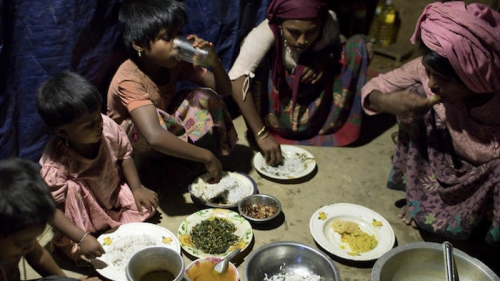Dealing with Prostitution
According to an Associated Press report, about 300 prostitutes celebrated their court victory on March 30 against their eviction from the Tanbazar brothel in Bangladesh, singing and dancing through the streets of the capital Dhaka. This is but a symptom of a deep-rooted social syndrome that needs much greater pondering and public action.
Despite being a social taboo and moral horror, prostitution grew as a semi-legal business under the British rule in South Asia. Little has been written about this phenomenon from the perspective of social history. Even after the 1947 independence of Pakistan, prostitution remained an undisturbed business in the country's major cities. During the liberation war of Bangladesh in 1971 many of those brothels were dismantled; yet, many others still remain. Currently, Bangladesh has an estimated 1700 prostitutes of whom 10,000 are child prostitutes.
The Tanbazar brothel is the largest in Bangladesh. In July 1999, following public protests, the Bangladesh government dismantled this brothel, evicting some 700 prostitutes of its prostitutes. Ahead of the dismantling, however, about a thousand other prostitutes slipped away to operate from private homes, while those evicted were locked up in a vagrant center for rehabilitation, which the government has yet to follow through.
The Tanbazar brothel sparked public protests only rarely when it made news headlines. About 15 years ago, for example, a 12-year old girl who came from a village to the capital city in search of work for a living was tricked into the brothel. During an ordeal of forced induction to the brothel against her will, she succumbed to injuries. Public outcry continued for a few days. The elderly woman who recruited her was arrested and, after that, the whole Tanbazar phenomenon sneaked away from the public view.
Now the Tanbazar prostitutes have offered new challenges for the Bangladesh government and society at large. While celebrating their court victory, they Dhaka claimed the ruling has given them back their "constitutional and human rights." The judges found that there were no laws prohibiting prostitution in Bangladesh. They viewed the case from the premise that anything is legal until made illegal--somewhat like people are innocent until proven guilty. The argument went: as long as prostitutes vote and pay taxes, they have legal rights to continue their business, and the government dismantling of the brothel was wrong because it curbed "women's right to work."
Some so-called NGOs, human rights and women rights groups in Bangladesh also criticized the government action for various reasons. They are right in criticizing that the government does not have a comprehensive constructive plan to deal with the problem. They are, however, awfully wrong to defend prostitution as a means of livelihood. Ironically, some doctors who fear the spread of AIDS also welcomed the court ruling. They thought it would facilitate their distribution of condoms to prostitutes in their enclaves. It is difficult for them to distribute condoms to prostitutes who operate from behind the scenes from private home. Yet, stupidly they thought just by distributing condoms they could mandate their use behind the curtains with their clients.
Like the government, the social and religious leaders have reacted only when prostitution as a profession created disturbing news headlines. Other than sermons, they have had no agenda for proactive social action to deal with prostitution. When a young woman in a brothel was killed, they stayed away from performing her burial rites.
Prostitution is a social syndrome, more than a legal, social, and moral problem. Prostitution thrives not just because of moral or legal slacks but also because of economics. To prevent prostitution, just legislation or law enforcement is not enough. In the absence of a proper treatment, the law enforcement works only as a surgical operation that doesn't kill the virus.
There are laws prohibiting prostitution is many lands such as most of the U.S. other than Nevada. Yet, prostitution thrives. In the U.S., prostitution is a 14.5 billion dollar a year business, according to PROMISE, San Francisco agency that specializes in getting women out of prostitutionOn Sunday, The New York Times reported some CIA findings that about 50,000 women and children a year are tricked into coming to the United States and forced to work as prostitutes, sweatshop laborers or servants.
Prostitution is a multi billion-dollar business in many countries including Thailand and the Philippines. During the WWII, the Japanese armed forces herded many decent women of South East Asia into brothels called "comfort" wagons and centers. During the Viet Nam war, the U.S. soldiers helped brothels to grow into a booming industry. In Thailand, for example, there were 20,000 prostitutes in Thailand in 1957; by 1964, after the United States established seven bases in the country, that number had skyrocketed to 400,000. Now Thai brothel industry attracts crowds of international tourists.
Similar economic dynamics are a play with prostitution in Bangladesh. According to UNICEF's report Status of the World's Children 1997, as the U.S. Senate passed a law banning imports from firms employing child labor, the businessmen in Bangladesh laid off 50,000 mostly female children from the garments industry. Many of those laid off fell into the traps of local and international traffickers in women.
In Bangladesh, as in other countries, criminal rings operate in an underworld to lure young women looking for work into cells from where they cannot escape. Once in their grip, they are tortured, brainwashed, and conditioned to accepting their fate for the rest of their life as prostitutes. Once a prostitute, they have no escape to get back to a normal living.
According to a tradition, when a man brought stealing charges against two of his servants, Omar who was the Caliph as well as the Chief justice of the early Muslim state inquired about the reasons for stealing. As the servants said they stole because they were not given enough food, Omar told the plaintiff that if his servants stole a next time he would cut his (accuser's) hands, not of those who would steal.
Muslims everywhere must look at the phenomenon of prostitution in Bangladesh from this perspective of Omar and not shirk their social and moral responsibility in dealing with it. Like stealing, prostitution is more than a matter of legislation and law enforcement. It is more than a legal problem, demanding sociological and economic remedies.
Mohammad A. Auwal is an assistant professor in the Department of Communication Studies at California State University, Los Angeles and is a regular columnist for iviews.com

















